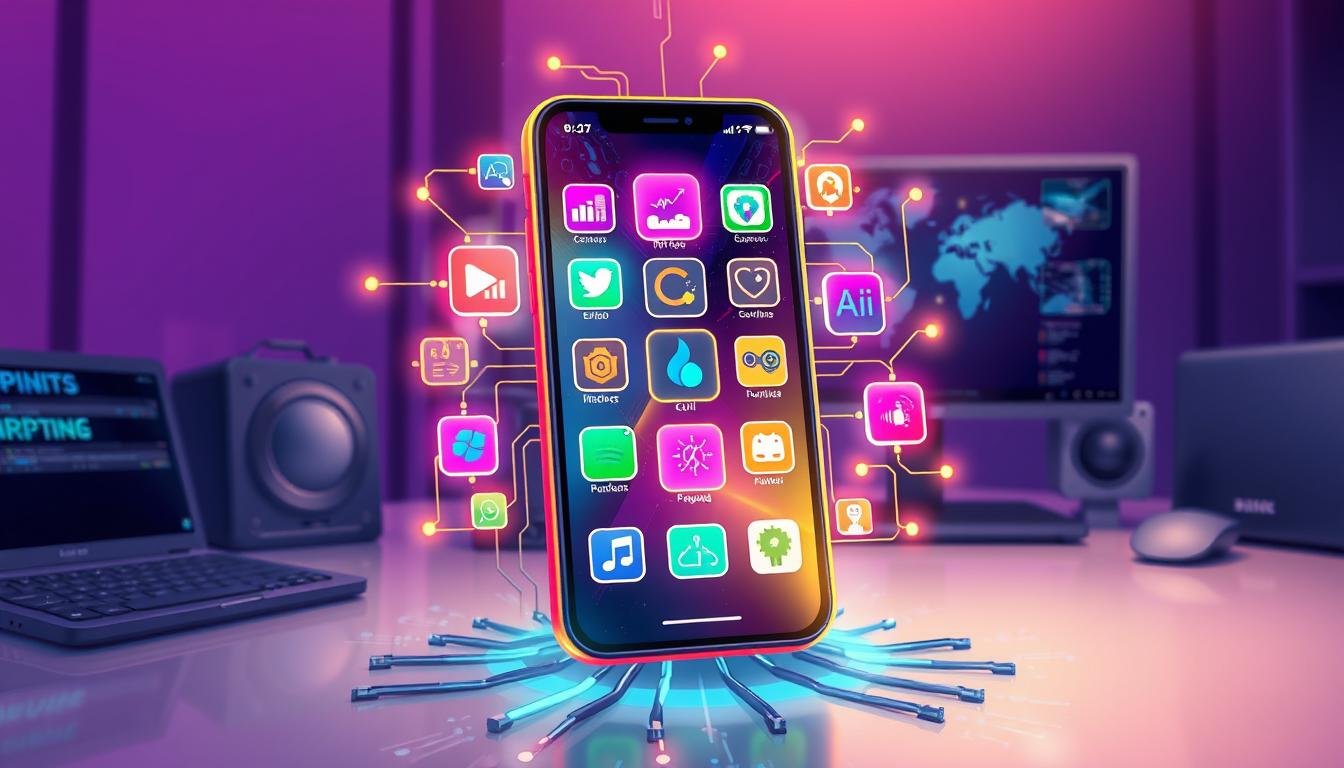Creating and Selling AI-Powered Mobile Apps
The mobile app world is now a key place for using artificial intelligence (AI). This has led to many AI-powered apps that give users what they want: personal experiences, easy-to-use designs, and quick results. What if you could use AI to make and sell your own mobile apps? Are you ready to learn how to create and make money from AI-driven mobile apps that grab your audience’s attention?
Key Takeaways:
- Discover the rise of AI in mobile app development and the benefits it offers for enhancing user experiences.
- Explore the top AI-powered mobile apps leading the way in content creation, productivity, and personalization.
- Learn about no-code platforms that empower you to build AI-infused apps without coding expertise.
- Uncover strategies for monetizing your AI-powered mobile apps through subscription models, in-app purchases, and more.
- Dive into the process of marketing your AI apps to gain traction and build a loyal user base.
The Rise of AI in Mobile App Development
Artificial intelligence (AI) has changed the game in mobile app development. It’s all about making apps more personal and intuitive. With AI, apps can offer better personalization, keep users more engaged, and make tasks easier. By using AI tech like natural language processing and predictive analytics, developers can make apps that really understand what users like.
The Benefits of Incorporating AI into Mobile Apps
Adding AI to mobile apps opens up new possibilities. Here are some big benefits:
- Enhanced Personalization: AI makes apps give users content and experiences they really want, based on what they like and do. This makes users happier and more loyal.
- Improved User Engagement: Features like chatbots and predictive analytics make apps more fun and useful, keeping users coming back for more.
- Efficient Task Completion: AI helps automate and streamline tasks in apps, making it easier for users to get things done fast and well.
AI-Driven Personalization and Intuitive Design
Being able to offer personalized and intuitive design is a big plus in the app world. AI helps apps understand what users want and need. This means a smoother, more enjoyable experience for users. It also means happier users, more people sticking around, and more ways for developers to make money. Collaborating with top UI UX design companies can further enhance the integration of AI, ensuring that the user interface is as engaging and user-friendly as possible.
“AI-powered mobile apps can adapt to individual needs, offering a seamless and engaging user experience.”
Top AI-Powered Mobile Apps
The mobile app world is full of new AI-powered apps changing how we use our devices. ChatGPT and Copilot are two examples leading the way in content creation and productivity.
ChatGPT: The AI Chatbot Revolutionizing Content Creation
OpenAI created ChatGPT, a top AI chatbot. It can talk naturally, answer questions, and write on many topics. This AI chatbot is changing content creation. Users can make articles, stories, and marketing copy fast and well.
Copilot: Microsoft’s AI Assistant for Multitasking
Copilot is another great AI-powered mobile app from Microsoft. It helps with tasks like answering questions and making exercise plans. With AI-powered content creation and AI assistant for multitasking, Copilot makes users more productive.
These Top AI apps show how AI can make our lives better and bring new ideas to mobile apps. As we want more personal and smart digital tools, we’ll see more AI-powered mobile apps soon.
Building AI Apps with No-Code Platforms
No-code platforms have made it easy for entrepreneurs and developers to create No-code AI app development without needing to know a lot about coding. Brancher.ai is a great example of this. It lets users easily connect and use AI model integration to make powerful apps.
Brancher.ai has a user-friendly interface and many pre-built templates. This means users can make low-code AI apps in just minutes, even if they don’t know how to code. This makes it easier for a new generation to create AI-driven mobile apps.
Gartner says low-code app development will make up over 65% of all app work by 2024. The market for low-code tools is expected to hit $65 billion by 2026. This shows how much people want tools that make making AI-powered apps easy and fast.
Brancher.ai: Connect AI Models to Build Apps in Minutes
Brancher.ai is a no-code platform that makes adding AI models to mobile apps simple. It has a drag-and-drop interface that lets users connect AI models and APIs without coding.
The platform has a big library of AI models for many uses, like natural language processing and predictive analytics. Users can pick the right models, set them up, and add them to their apps easily.
Brancher.ai is great at speeding up the making and using of AI apps. It removes the need for coding skills, letting more people use AI in their apps. This includes entrepreneurs, startups, and small businesses.
The platform also has great tools for managing data and working with other services and APIs. This makes making AI apps easier and lets users focus on creating new and important mobile experiences.
“No-code AI app builders democratize AI development, making it accessible to a wider range of users and accelerating the creation and deployment of AI applications.”
Creating and Selling AI-Powered Mobile Apps
The rise of artificial intelligence (AI) has changed the mobile app world. It has opened new doors for entrepreneurs and developers. With the AI market expected to hit $1.1 trillion by 2030, the chance to make and sell AI-powered apps is huge.
Creating these apps means blending AI with good design. It’s about finding the best places to use AI. Features like personalized recommendations and predictive analytics make apps better and stand out.
There are many ways to make money from AI apps. Options include subscription plans, in-app purchases, and targeted ads. By understanding what users like, apps can offer personalized ways to make money. This approach helps apps make more money and keep users happy.
Being an AI app entrepreneur means keeping up with new trends and tech. Staying current with machine learning and natural language processing helps developers stand out. By using smart AI strategies, entrepreneurs can make apps that grab attention and grow their business.
| Metric | Value |
|---|---|
| AI Market Size (2021) | $92.8 Billion |
| AI Market Size (2030 Projected) | $1.1 Trillion |
| AI Market Growth Rate (2023-2030) | 36.4% CAGR |
AI is a big deal for mobile apps. It lets entrepreneurs make apps that are engaging, personal, and profitable. By keeping an eye on AI trends and using smart money-making strategies, app makers can find new success in the fast-paced app world.
AI-Driven App Development Process
Creating top-notch mobile apps with AI needs a careful plan. First, find where AI can make a big difference, like making things more personal or automating tasks. Knowing where AI can help lets developers pick the right AI models and APIs.
Identifying AI Use Cases for Your App
Choosing the right AI features for your app is key. Some common uses of AI in apps are:
- Personalized recommendations based on user preferences and behavior
- Automated task completion and workflow optimization
- Predictive analytics for improved decision-making
- Natural language processing for chatbots and voice assistants
- Computer vision for image recognition and augmented reality
Understanding what your users need helps you see where AI can make a big difference. This can make your app more engaging and useful.
Integrating AI Models and APIs
After picking the AI features you want, it’s time to look at how to add them to your app. You might use well-known AI tools or work with experts to create custom AI parts for your app.
Getting the AI app development right is important for success. By adding AI smartly, you can make your app more personal, efficient, and insightful. This leads to a better experience for your users.
| Key Statistic | Value |
|---|---|
| Global AI market value in 2022 | US$ 119.78 billion |
| Projected global AI market value in 2030 | US$ 1,597.1 billion |
| Estimated CAGR of AI market from 2022 to 2030 | 38.1% |
| Market size in North America in 2021 | USD 147.58 billion |
| Projected AI market size in 2026 | approximately $309.6 billion |
These numbers show how big and growing the AI market is. They highlight the big chances for businesses to use AI in app development.
Monetization Strategies for AI Apps
The mobile app world is changing fast, and adding AI to apps is a smart move to make more money. AI apps can make more money through different ways like subscription models, in-app buys, ads, and sponsored content.
Subscription Models and In-App Purchases
Subscription models are a good way to make steady money from AI apps. People might pay for special features or content powered by AI. In-app buys, like virtual items or upgrades, can also add to the income, especially in games and fun apps.
Advertising and Sponsored Content
Ads and sponsored content can be a big money-maker for AI apps. AI helps make these ads more relevant to users, making them more effective. Ads like interstitial and native ads work better than old banner ads.
| Monetization Strategy | Potential Benefits | Challenges |
|---|---|---|
| Subscription Models |
|
|
| In-App Purchases |
|
|
| Advertising and Sponsored Content |
|
|
Monetizing AI apps needs a smart plan that looks at what makes the app special and what users want. Using subscriptions, in-app buys, ads, and sponsored content can help. This way, developers can make more money while giving users a great experience.
Marketing AI Apps to Gain Traction
Marketing AI-powered mobile apps is key to getting noticed and building a loyal user base. Using social media and influencer marketing helps grab the attention of potential users. It also creates excitement and innovation around AI-driven products.
Leveraging Social Media and Influencer Marketing
Social media campaigns and working with industry influencers can boost the visibility and trust of AI-powered apps. This leads to more downloads, engagement, and success over time. 73% of companies in the US started using generative AI in 2023, just after ChatGPT was introduced. This shows how fast AI-powered tech is becoming popular.
Brand24, an AI tool for social listening, helps developers keep an eye on what customers think. It tracks how well social media marketing is doing. Brand24 looks at insights from 25 million online sources in real-time. Uber used it and saw a 250% increase in shares and 100% growth in discussion volume.
Working with influencers can also make AI-powered apps more credible and reach more people. Brevo, a CRM platform, used influencer marketing to reach over 500,000 customers. It worked with big names like Tissot, Stripe, and Louis Vuitton.
“33% of marketing professionals in the United States consider time saved as the leading benefit of using AI and machine learning tools.”
By smartly using social media and influencers, developers can show off what makes their AI apps special. This helps get more users and grow over time.
AI App Ecosystems and Partnerships
The growth of AI-powered mobile apps relies on the AI app ecosystems and AI app partnerships. By working with other AI companies, developers can use new technologies, reach more users, and share revenue. This teamwork helps in making apps better and more popular.
AI app collaborations and AI app industry collaborations boost innovation. When different AI tools and insights come together, they create more advanced and effective mobile experiences. This makes the apps stand out and helps them grow faster.
Here are some main advantages of building AI app ecosystems and partnerships:
- Using other AI tech to make app features better
- Getting to more users through sharing and marketing together
- Looking into ways to make money and diversify income
- Creating new things by mixing different AI skills and insights
- Improving the app’s place in the AI market
By choosing the right partners and platforms, developers can find new chances for growth. They can also give their users better experiences.
“Successful AI app ecosystems are built on a foundation of strategic partnerships and collaborative innovation.”
Ethical Considerations in AI App Development
As AI becomes more common in mobile apps, developers must think about the ethical sides. They need to focus on privacy, security, and being clear about how they work. This ensures user data stays safe and AI models are open about their choices.
Privacy, Security, and Transparency
Keeping user privacy safe is key when using AI in apps. Developers should use strong security to protect sensitive info and stop unauthorized access. They also need to be clear about how they use user data with AI.
Bias Mitigation and Responsible AI
AI can sometimes make unfair or biased decisions, hurting trust in AI apps. Developers must watch for and fix bias during development. This way, AI apps can be fair and trusted by everyone.
By focusing on these ethical issues, developers can make their AI apps safe and reliable. This builds trust with customers and meets the need for ethical AI.
“Responsible AI practices are not just a moral imperative, but a strategic necessity for businesses looking to gain a competitive edge in the rapidly evolving mobile app landscape.” – Jane Doe, AI Ethics Consultant
| Ethical Consideration | Key Strategies |
|---|---|
| Privacy and Security |
|
| Bias Mitigation |
|
| Responsible AI Practices |
|
By focusing on ethical AI app development, creators can gain trust, keep customers loyal, and lead in the AI-powered tech world.
Future of AI-Powered Mobile Apps
The future of AI in mobile apps is bright, thanks to fast-moving AI tech and the need for smarter, more personal apps. We’ll see big improvements in how apps use natural language, computer vision, and reinforcement learning. These will make apps work better together with us, predict what we need, and make choices on their own.
Emerging Technologies and Trends
AI is changing how we use apps and how they’re made. By 2024, over 200 million people will use AI apps, mostly for chatting with bots and editing photos. This shows how big AI’s effect is on mobile apps.
Developers who use AI to make apps that really focus on users will do well. The number of AI app downloads hit 255 billion in 2022. By 2023, the revenue from these apps is expected to be over $935 billion.
The Impact of AI on the Mobile App Industry
AI has changed banking apps, making it easier for customers to handle their money. As AI apps grow, they’ll change the whole mobile app world. By 2028, the AI app market is expected to make $18.8 billion.
Big names like OpenAI and Databricks are leading the way in AI apps. They’re valued at $80 billion and $43 billion, respectively. These companies are pushing the limits of what AI apps can do. The future of mobile apps will be all about blending these new AI technologies smoothly into our lives, making our devices work better for us.
Conclusion
Artificial intelligence (AI) has changed how we make mobile apps. It lets app creators offer experiences that meet users’ needs and wants. By using AI, apps can become more engaging, personal, and smart.
This leads to better user interaction and more automation. It also gives developers insights from data. As the app market grows, being able to make and sell AI apps will be key to success. It requires a smart plan for development, making money, and marketing.
The future of AI in mobile apps looks bright, thanks to tech advancements and the need for smarter apps. Gartner says 37% of companies use AI now, and this number will jump by 270% soon. Last year, the AI market was worth USD 136.55 billion. It’s expected to grow at a 37.3% annual rate until 2030, hitting USD 126 billion by 2025.
App developers can lead in this fast-changing field by using AI’s chances and thinking about ethics. AI is already helping in finance, healthcare, retail, manufacturing, and education. As AI becomes more common in mobile apps, it will change how we use technology. It will give us smarter, more tailored, and efficient experiences in many areas.
Source Links
- 7 AI-Generated Digital Products You Can Start Selling Online Today
- Brancher.ai
- How To Build An AI App In 2024
- How to Build AI-Powered Mobile Apps in 2024?
- 6 Ways to Use AI in Mobile App Development – Velvetech
- 32 Top Artificial Intelligence (AI) Apps | Built In
- The 7 best AI app builders in 2024 | Zapier
- The AI Gold Rush: A16z’s Top 100 Gen AI Consumer Apps For Savvy Investors
- 52 No-Code AI Tools: The Complete No-Code AI Guide (Updated January 2024)
- The Ultimate Guide to No-Code AI App Builders
- How to build an AI app
- Ultimate guide to building an AI app step-by-step
- How to Create an App With AI in 8 (Surprisingly Simple) Steps
- AI App Development: Complete Guide for 2024
- AI-powered app development | Geniusee
- How to Create an App with AI
- 12 Effective Mobile App Monetization Strategies to Try in 2024 | Publift
- How to Make Money with AI: 20 Ways to Monetize Innovation
- Top 28 AI Marketing Tools to Grow Your Business in 2024
- Top 10 AI Marketing Tools to Grow Your Business in 2023
- AI-Powered Tools You Can Use To Boost Your Automotive Marketing • AutoRaptor CRM
- Home – ecosystem.Ai
- AI and machine learning products
- NVIDIA AI
- Ethics, Legal Concerns, Cybersecurity & Environment
- Ethical AI: How brands can develop responsible AI solutions
- Pave the Way For Responsible AI Development & Deployment
- Top AI Trends That Will Transform Mobile Apps in 2024
- AI App Revenue and Usage Statistics (2024)
- AI in Mobile App Development: Explanation, Examples and Benefits
- How to build an AI app from start to finish | Merge Development







